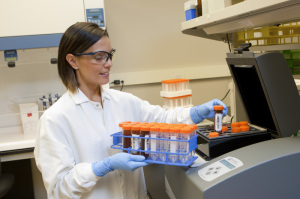by
Lauren Dubinsky, Senior Reporter | April 22, 2016

Courtesy of Exact Sciences
The colon cancer screening test Cologuard has shown promise in clinical trials, but researchers at USMD Physician Services wanted to find out how well it would work in a ‘real-life’ scenario. The results, which were presented at the American Association for Cancer Research annual meeting, suggest the noninvasive test could improve compliance rates and thereby catch more instances of the disease.
Colon and rectum cancer are the second leading cause of cancer death in the U.S., according to the National Cancer Institute. Even though there are many colon cancer screening options, over 40 percent of Americans are not getting screened, according to Dr. Mark Prince, one of the study’s authors and director of gastroenterology at USMD.
Each day, the lining of the colon naturally sheds cells and if someone has cancer or precancer in their colon, abnormal cells are shed and they are picked up by stool as it passes through. Cologuard — which is produced by Exact Sciences — can identify elevated levels of altered DNA and/or hemoglobin in the abnormal cells, which could indicate cancer or precancer.
In August 2014, Cologuard was approved by the FDA to detect colon cancer and in October 2014 it was approved for Medicare coverage for asymptomatic average-risk beneficiaries between the ages 50 and 85. Commercial payors do not yet provide coverage for this treatment option.
A clinical trial published in the
New England Journal of Medicine involving 10,000 patients found that Cologuard is 92 percent sensitive for detecting colon cancer and 42 percent sensitive for precancer, with a specificity of 87 percent.
In this new study, Prince and his fellow researchers performed a retrospective medical records review of Medicare-eligible patients treated by physicians at the USMD. They selected patients who were at average risk for colon cancer and not previously compliant with recommended guidelines for screening.
From October 2014 to September 2015, physicians at USMD ordered 393 mt-sDNA studies and 347 patients completed the tests, which was an 88.3 percent compliance rate. They found that 51 patients tested positive by Cologuard and were referred for diagnostic colonoscopies.
Out of those patients, 46 received follow-up colonoscopies. Three of the patients refused to undergo the procedure and two patients didn’t respond to the physicians’ attempts to follow up.
Among those who had the follow-up procedure, four were diagnosed with colon cancer, 21 were diagnosed with advanced adenoma, nine had non-advanced adenoma and 12 tested negative. Prince noted that none of the patients reported any symptoms and all had refused colonoscopies in the past.
When CMS announced that it would cover Cologuard procedures,
the American College of Radiology (ACR) was pleased, but also disappointed because the coverage was not also extended to CT colonoscopy (CTC) or virtual colonoscopy.
In a letter to CMS, ACR stated that although Cologuard tests are twice as sensitive as the fecal immunochemical test for detecting advanced adenoma, CTC can bring the accuracy of colon polyp detection up to 90 percent. In terms of detecting colon cancer itself, Cologuard detects up to 92 percent and CTC may detect up to 96 percent.
“Colon cancer screening saves lives,” Prince said in a statement. “Colonoscopy is the best form of colon cancer screening, but for patients who will not have a colonoscopy, a noninvasive screening test like Cologuard is needed.”
